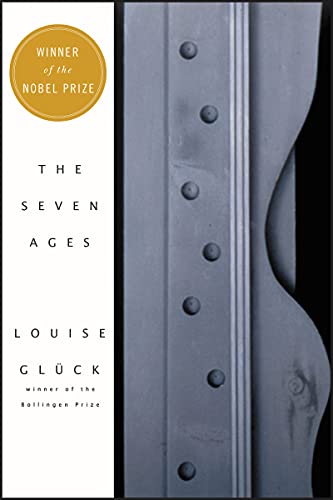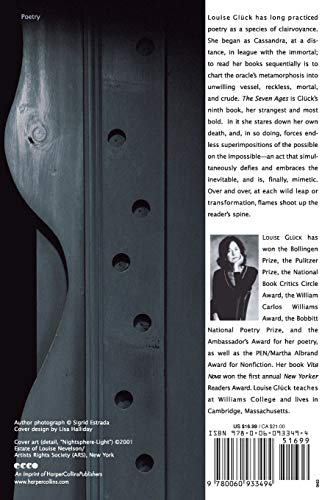Customer Services
Copyright © 2025 Desertcart Holdings Limited



The Seven Ages
M**A
Life’s moments
Luved it... hadn’t read Gluck before but felt I should after she earned the Nobel... she makes the ordinary extraordinary!
M**I
Five Stars
Great Product
P**A
Delight, then solace
"Earth will seduce you," Gluck writes in The Seven Ages, "It will ravish you, it will not keep you alive." In her ninth collection, Gluck reflects on entering her fifth decade, and looking back on a life of pleasures and disappoints, ponders what it was all about. What makes it worth it? Her simplicity and quiet tone places immense pressure on every line, so that we feel the authority of her statements as if listening to a prophet.The moments that she chooses to reflect on are ordinary ones, though they are invested with enormous power and significance. These include standing in her grandmother's kitchen, watching her make a fruit punch, "aroma of summer fruit, intensity of concentration: the colored liquid turning gradually lighter more radiant, more light passing through it. Delight, then solace." A moment like this is turned into a transcendent meditation where "the self disappears into it or inseparable from it, somehow suspended, floating, its needs fully exposed, awakened, fully alive." (The Sensual World). In "Eros," she writes, "I had drawn my chair to the hotel window, to watch the rain. I was in a kind of dream or trace--in love, and yet I wanted nothing." To read this poetry is to enter into meditation with the poet, utterly absorbed in the present, lost in the simplest objects--rain, wind, a flower petal, light, to become a mind utterly sated by the grandeur of existence.This hunger to know the moment, to pursue eternity in every breath, is heightened with the realization of impending death. Even though the mind wants to live and relive all its exultations, "The body continues like the path of an arrow as it has to, to live." This conflict is most poignant in "Ripe Peach," where the speaker describes life as a "disappearing sweetness surrounding the stone end." How do we live with so much, and then have to give it up in the end? She asks "Is there light that survives the end which the mind's enterprise continues to live"? The poem provides no resolution, except to the thing itself: "There was a peach in the wicker basket. there was a bowl of fruit. Fifty years. Such a long walk from the door to the table." Gluck's poetry as a way of stretching the simplest facts, so that the walk from the door to the table is the breadth of fifty years.All we have of life is what is in front of us. We cannot go back or stop the passage of time, even though we yearn with all our might to have it again. "Balm of the summer night, balm of the ordinary, imperial joy and sorrow of human existence, the dreamed as well as the lived---what could be dearer than this, given the closeness of death?" We are all close to death, at every moment, at the same time every moment has the potential for eternity. That realization is the heart of each of the poems in The Seven Ages.I give it 4 stars instead of 5 because Gluck has taken risks in this collection, and sometimes it works better than others. Simplicity is a risk, when sparseness can lend power to a simple image, it can also fall flat. In a few poems Gluck's pronouncements feel prosaic, more telling than showing. The poems in the first section have the strength of both descriptive imagery and prophetic pronouncement. "The Sensual World" stands out to me in this regard. Some of the later poems have less power, and I think they would not stand up by themselves without being bolstered by others in this collection.
N**G
Another amazing collection
The Seven Ages is another amazing collection by Louise Gluck. Disagreeing with what is said in the blurb of my Carcanet edition, which says this book is the "strangest" and "most bold" (to date of publication), a lot of poems in The Seven Ages are relatively more accessible than those in Wild Iris.Readers have to slow down to read Louise Gluck to enjoy how the poet inserts pauses and controls the rhythm of her works, therefore focusing on the key element on each line, be it a verb, a noun, or even a punctuation mark. This is what I fall in love with her poetry after reading A Village Life, her latest full-length collection. I could allow myself some quiet time and be guided by her craft and wisdom.The first half of the book contains many strong pieces, while a few in the second half (which I less like) are a bit convoluted or could further be tightened in my personal views. Yet, just reading how Gluck opens her poems and the way she jungles simple poetic diction is enlightening. My favorite examples from The Seven Ages include:"I even loved a few times in my disgusting human way / and like everyone I called that accomplishment" ("The Seven Ages")"And from out of nowhere lovers came, / people who still had bodies and hearts. Who still had / arms, legs, mouths, although by day they might be / housewives and businessmen." ("Moonbeam")"Familiar, recognizable, but much more deeply alone, more despondent. / She does not, in her view, meet the definition / of child, a person with everything to look forward to." ("Birthday")"We had only a few days, but they were very long." ("The Destination")"Even when we weren't touching we were making love." ("The Balcony")"Sickness, gray rain. The dogs slept through it. They slept on the bed, / at the end of it, and it seems to me they understood / about childhood: best to remain unconscious." ("Time")I would like to say particularly how much I love the Carcanet edition I have ordered. The book is slimmer than usual and the fonts are smaller , but it is exactly why I love Gluck's poetry more - compact, solid, something you hold in your hand, but you have to look up from the book, gazing into distance to think about what she really wants you to know about words.
Trustpilot
2 months ago
2 days ago